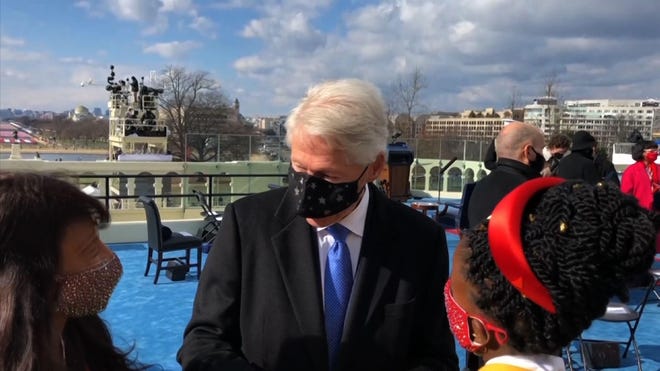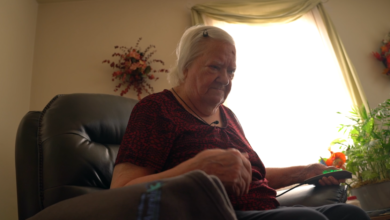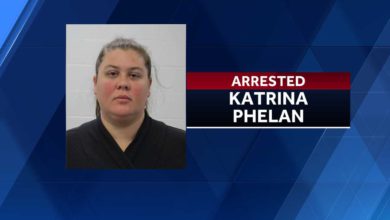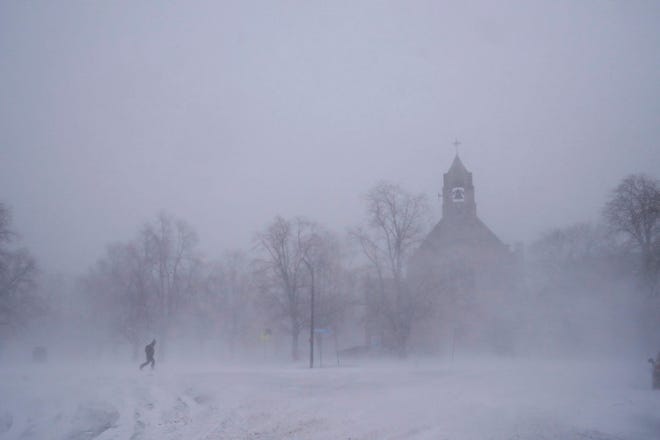Marcella Thompson believes what happened to her son in the early evening of June 12 could happen to any child on any street in any Cincinnati neighborhood.
She believes the stray bullet that struck 8-year-old Marcellus, a third-grader who loves Disney movies and Pee Wee football, could have found another mother’s son, and turned another family inside out with grief and worry.
But Thompson, who lives in East Westwood, also believes not everyone shares that risk equally. The way she sees it, her city is divided between places where the violence that seriously injured her son is tolerated, and places where it is not.
"Why are we different?" Thompson asked last week, soon after she returned home from the hospital wearing the "24-hour visitor" badge that allows her to see her bedridden son anytime, day or night. "We're all human. We all bleed the same blood."
And yet, she said, "we're in two different communities."

The divide is more than the hunch of a grieving mom. It shows up in thenumbers, too.
An Enquirer analysis of crime statistics found that aggravated assaults, which include shootings like the one that wounded Marcellus, are skyrocketing in a few Cincinnati neighborhoods, even as many others see little or no change.
Westwood, Over-the-Rhine and Walnut Hills account for one of every four aggravated assaults in Cincinnati so far this year.
Together, those three neighborhoods have seen a 73% increase in aggravated assaults over last year. The city’s 52 neighborhoods overall have seen an increase of about 5%.
It’s no surprise to police or to residents that some neighborhoods are more violent than others, or that neighborhoods that have historically struggled with violent crime are among those struggling now.
But the sudden surge in only a handful of those neighborhoods is hard to explain. The motives behind the assaults, according to police, run the gamut from domestic disputes to drug-related feuds to arguments that turn into gunfights and end up maiming and killing bystanders, even if they're only 8 years old.
The pandemic can’t be blamed, either. Aggravated assaults in Westwood, Over-the-Rhine and Walnut Hills are significantly higher compared not only to last year but also to the average of the previous three years.
The wave of violence in those neighborhoods is especially confounding because it comes at a time when, statistically speaking, the city overall is holding its own against violent crime.
While homicides are down citywide and aggravated assaults are up slightly, that’s not the case in Westwood, Over-the-Rhine and Walnut Hills. Those three neighborhoods are suffering in ways other neighborhoods are not, and so are the families that live there.
For Thompson, the divide is personal. She sees the consequences every day when she sits in the hospital room with her son, wires dangling from his head and arms, his long hair shaved so doctors can monitor the bullet wound in his head.
And she sees them every night, when she settles into the chair next to Marcellus's bed, watching her son's chest rise and fall as she dozes off.
"Some days," she said, "I don't know if he's going to make it through the night."

'Is this really happening?'
A few hours before Marcellus was shot, Thompson took her son shopping. They bought a white polo shirt and shorts for family pictures, which were supposed to be taken on the Fourth of July, and some chips and cheese for movie night nachos that evening.
Around 6 p.m., Marcellus’s big brother, 17-year-old Marcello, told his mom he was going to walk to the convenience store at the corner of McHenry and Cavanaugh to meet a friend and bring her back to the house for the movie.
Marcellus, who everyone calls “MJ,” asked if he could tag along. Thompson rarely allowed Marcellus to go anywhere without her, especially this summer. While she can't cite the statistics – aggravated assaults are up 11% in East Westwood so far this year and 33% in nearby Westwood – she knows that her immediate world is dangerous.
But this was just a quick trip down the street. Marcellus wanted to go.She said yes.
Soon after Marcellus and his brother got to the parking lot of the convenience store, the shooting started. Two teenagers had been arguing, one drew a gun and opened fire. Within seconds, a teenager, Marcellus and two other young children were shot.
Thompson rushed to the scene, and then to Cincinnati Children’s Hospital Medical Center, where doctors told her Marcellus had been shot in the head and had a serious brain injury.
“Oh, my God,” she thought. “Is this really happening?”
The scene outside the convenience store that day was familiar to police, who say shootings with multiple victims are driving up the city’s total number of aggravated assaults. Cincinnati has had six mass shootings so far in 2021; scroll to the bottom of the story for a complete list.
At a Cincinnati City Council committee meeting in June, about two weeks after Marcellus was shot, Police Chief Eliot Isaac said his officers have seized 750 guns this year and that gun crime was “at epidemic proportions.”
They’d soon get another reminder. After a long day of celebrating the Fourth of July, two young men opened fire on one another as they stood in a crowd that had gathered in Cincinnati’s Smale Riverfront Park.
When it was over, both youths were dead and three bystanders were wounded. The violence in the heart of Cincinnati stunned city officials and became a major news story.
Thompson, who was still spending most of each day at her son’s hospital bedside, was saddened but not surprised. No one is immune from gun violence, she said, even if only a few neighborhoods are bearing the brunt of it.
In the days that followed, Thompson watched and listened to the outcry over the Smale Park shootings, and she wondered why there’d been no comparable outcry over the shooting of her son and the other kids in the convenience store parking lot.
She thinks she knows the answer now. Through the first six months of this year, Westwood and East Westwood reported 54 aggravated assaults. Downtown and the riverfront reported 12.
Thompson said people expect violence in neighborhoods like hers. They've grown accustomed to it. Why did it take the shooting at Smale Park to get everyone's attention?
“Because we’re in two different communities, two different ways of living,” Thompson said. “I live here. They live there.”

Police target criminals with guns
Sometimes, the divide is within the neighborhoods themselves.
In Over-the-Rhine, which has been transformed by new homes, bars and restaurants in the past decade, the dividing line is Liberty Street, which separates more gentrified areas in the south from poorer areas in the north, where crime tends to be higher.
“Same zoning, same historic district, same police district,” said Brian Conner, an Over-the-Rhine resident and community council member. “Two totally different worlds.”
Aggravated assaults in Over-the-Rhine have almost doubled compared to the first six months of last year, from 18 to 35. Conner, who sits on a community council committee that’s studying the increased violence, said many of Over-the-Rhine’s problems involve people who aren’t from the neighborhood but who come there to party and stir up trouble.
“Everybody is terrified,” he said. “We’re past the point of people complaining about it. People are starting to get quite anxious and angry.”
Chief Isaac announced last week that police will try to address trouble spots in hard-hit neighborhoods by adding dozens of officers to weekend shifts. “Our department’s biggest asset is our presence,” Isaac said.
In Walnut Hills, where a nearly 150% increase in aggravated assaults is the largest in the city, the goal is to take guns and the people who wield them off the street. “We all want the same thing,” said Lt. Jonathan Cunningham, who leads the investigative unit in Police District 4, which includes Walnut Hills. “We all want gun violence to stop.”
Cunningham said his officers use ShotSpotter to track gunshots, their own data to identify hot spots and community outreach to encourage witnesses to come forward. The work is hard, he said, but it’s the only way to make progress.
“In a perfect world, we’d have an officer on every street corner and community members calling every time they saw someone with a gun tucked under their shirt,” Cunningham said. “But we don’t live in that perfect world.”
Hamilton County Common Pleas Judge Melba Marsh, who lives in Walnut Hills, has a habit of jotting down the location of every violent crime case that comes to her courtroom. Lately, she said, she’s seen more cases than usual from Westwood, Over-the-Rhine and her own neighborhood.
“It seems to have exploded,” she said.
Marsh said she’s concerned both as a judge who sees the aftermath of violent assaults and as a resident who must be more careful about jogging or walking near her home.
“My sense of security is heightened,” she said. “I’m more conscious of it.”

Five minutes from home
Late last week, Thompson attended a community council meeting to talk about what can be done about the violence. The meeting drew more than 50 residents from Westwood and East Westwood. They gathered in a small Presbyterian church with a sign over the front door that read, “Enough. Stop the violence.”

People in the meeting turned to her for guidance. Exhausted from so many trips to the hospital to see her child, she didn't have an answer.
“I feel like the community should come together and just do better,” she told the crowd.
Thompson said she prays every day for her son to get better, and for kids everywhere to be safe in their homes and their neighborhoods.
She wants to do something to help those kids. She wants to make a difference. She's talked to other moms whose kids have been hurt. She's talked about making some noise with politicians.
"I want them to stop the violence," she said. "I want them to care about every neighborhood."
The parking lot where Marcellus was shot is five minutes from his house. Her son took a short walk to the corner store and now the boy who once won Pee Wee football trophies may not walk again. He may never be able to see or speak or hear his mother's voice.
Thompson thinks about that often, about how a child’s life can change in an instant because someone he never met got mad and pulled a trigger. She wants everyone in Cincinnati to think about it, too, no matter where they live or where they’re raising their children.
She wants them to know that it was her child this time. But next time, it will be someone else's.
A Go Fund Me has been set up to help the family with medical expenses. To donate: https://www.gofundme.com/f/help-leep
Source link









